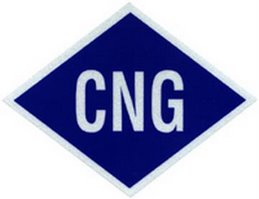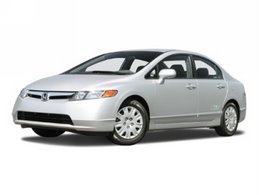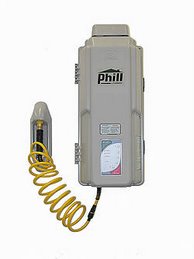I posted this on E-bay after looking at too many listings that just didn't seem to be right. Especially after the 200th time that someone listed their Propane car as a CNG. If you list your vehicle on E-bay, these are some ideas and conventions to follow.
Read all this article before listing. All information here is important and you should take great care listing.
You've decided to sell that CNG vehicle you have. Truth be told, either you thought you were buying something different, got something strange at auction, selling something for someone, or you just need to get that car off the lot that isn't selling. OK. First things first.
CNG stands for Compressed Natural Gas. CNG is not Propane!!! Natural gas is the same gas that comes out of your stove if you live in an urban area. CNG is not Propane!! (This is a pet peeve of mine, so I am emphasing it). There are great differences between the gasses and they are NOT interchangeable. They have different tankage structures, refueling hookups and the like. Propane is chemically different from Natural Gas. CNG is Methane and can only be compressed as a gas. Propane becomes a liquid when compressed which is why its officially known as LPG (Liquified Petrolium Gas). There ARE LPG vehicles out there including many models which were also made as CNG cars. LPG is derived from Natural gas as part of the refining process. Propane is commonly used in Bar-b-Que grills and forklifts. (As an aside, using LPG tanks for CNG systems and Vice versa is Extremely Dangerous and is not recommended).
In the alternative fuels boom in the late 1990's, many manufactures built cars in the factory which could run on CNG. Honda, Ford, GM, Chrysler, and Toyota featured models that are OEM vehicles. However, this ceased with lack of Federal government participation. GSA stopped buying them so the manufacturers stopped making them. However, many are in the aftermarket and you are seeing fleets getting rid of their CNG vehicles. Many airport fleets, taxi fleets and city governments bought CNG's as well and you can see them on the auction block as well. Honda is the only manufacturer which is still making CNG vehicles, a dedicated CNG known as the Civic GX.
There are two types of CNG vehicles, dedicated or "bi-fuel". Dedicated vehicles function solely on CNG. Bi-Fuel vehicles can function on both fuels.
There are also two compression ratios for fueling Most Vehicles manufactured before 1999-2000 are 3000 psi fueling standard and 3,600 psi afterwards. This is important to note in your listing.
Also, the expiration date on your tanks is important as well. Tanks from the manufacturer are certified for 12-15 years or 100,000 miles whichever comes first. Make sure to check your tank, there should be a label on the tank to locate this information. The expiration is necessary due to the high pressure that the tanks endure. An old tank can burst and that will give you a bad day.
Fuel locating is important. Its important that you know this as it makes operating the vehicle more difficult. If you have a dedicated CNG vehicle you must know where the CNG stations are. Since a dedicated vehicle MUST have CNG to run, you have to know the locations of stations in your area. If you live in an area where CNG is prevelant such as California, the Phoenix or Tuscon Metro areas, Utah, DFW Metro, Oklahoma, and some of the areas in the Northeast, then you can check with your local area to find out. Your Gas company would have information, they may even have a station. Your local Clean Cities Collation site will know where you can get the gas. Or you can check the the government EERE website at
http://www.eere.energy.gov/afdc/infrastructure/locator.html
A company called Fuelmaker sells refueling appliances for your home. This allows your vehicle to be refueled at home overnight using your regular natural gas hookups. Fuelmaker is only really available in California as they market their appliances with Honda in conjunction with their sales, however you can check with them Visit the website at
http://www.myphill.com/
Checking out your CNG vehicle is probably important. Locating a certified CNG mechanic can be difficult and probably you can check at the local Clean Cities Collation website or office. If you can't, then its probably best that you note that on you listing if you wish. Some dealers might perform a check if they have a CNG Mechanic. Ford Fleet services has a website where you can locate a certified dealer which may have a mechanic:
https://www.fleet.ford.com/dealer_locators
Inspecting your CNG cylinders is important as well. They must be inspected every 36,000 miles and replaced at 100,000 miles. A list of inspectors maybe located at the following website:
http://webext.csa.ca/cng/cngmain.asp#searchinspector
Now after all that, lets go through the advantages and disadvantages that can sell your vehicle.
Your CNG vehicle has some great advantages including the fact that CNG is CHEAPER. Depending on the subsidies, CNG can range from $1.00 to $1.50 cheaper than the equivalent amount of gasoline. Check your local rates. If you get it at home its even cheaper than at the pump.
Next, CNG burns much cleaner than most fuels. The oil will come out looking much the same way it went in. There are no soot deposits as in regular gasoline. Your service interval with oil changes is greater 6,000 to 12,000 miles vs 3,000 miles for regular gasoline engines. However, it is recommended that you still change the oil due to viscosity breakdown. CNG does burn hotter, which does contribute to viscosity breakdown, so its probably best you change it regularally still. With proper care, a CNG engine will last forever, much like a diesel engine.
Also, its clean burning, in fact much cleaner than any alternative fuel which is why the government was interested in it. In California CNG vehicles qualify for HOV lanes as a hybrid. (This may have changed of late, check with the DMV and make SURE that they know they are dealing with CNG). This is an environmentally friendly vehicle and is a good selling point.
Another point is that CNG is also produced entirely in the United States so you aren't giving money overseas for imported oil.
The disadvantages are as mentioned before the lack of fueling infrastructure.
Another disadvantage is that due to its being compressed gas, the range is limited because you have to have the huge tanks. On the passenger vehicles, this results in a smaller trunk space, especially if you have long range tanks installed. Most CNG's suffer from the lack of range and if you have a dedicated CNG vehicle, well you have to be towed to the nearest station if you run out. It might also tie you to your local area if you have a station, so there is no long trips. Also, if you purchase you vehicle, and there is no local stations or there is not a station in a practical route, you may need to have the vehicle transported.
Finding maintenance is also a problem. Although CNG and regular gasoline cars share many parts, there are some dedicated systems that you have to have maintained by a certified CNG mechanic. Check the links above for certified mechanics and inspectors.
All in all, you have a good car in spite of all the disadvantages. Promote the advantages and your vehicle will sell. Good luck.
Thursday, October 25, 2007
Subscribe to:
Post Comments (Atom)



1 comment:
Informative article thanks for sharing dear.
Houston cars
Post a Comment